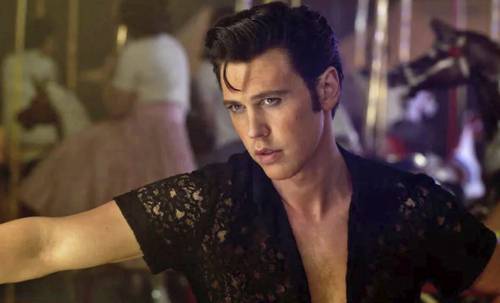Competition 'Tori and Lokita', the saddest and most beautiful film of the Dardenne brothers, and of this world
Special screening 'Moonage daydream', inside David Bowie's fascinating labyrinth
Competition 'Crimes of the future': Cronenberg eats Cronenberg in an orthodox celebration of himself
John Waters said that it is necessary to have an exquisite palate to appreciate what bad taste is worth.
In her classic study of '
kitsch
', Susan Sontag added that the '
camp
' sensibility (which is not equivalent to bad taste, but does not disgust her either) sees everything in quotation marks (or in italics).
And so the whole world becomes a representation of the representation itself that gives it meaning in a game of mirrors modeled by matters such as
irony, humor, parody, pastiche, artifice, theatricality and exaggeration.
And the
brilli-brilli should
be added.
When we stand in front of '
Puppy
', Jeff Koons's giant pooch located on the outside terrace of the Guggenheim Museum in Bilbao, we don't actually see a dog, we see "a dog" (in quotes and in italics), we see a giant West Highland terrier in bloom that he calls the elitist culture of the gallery that it guards than the popular culture of optimistic sentimentality that it champions.
It's '
kitsch
' for clever.
Baz Luhrmann
is of all directors the one who has known how to use quotation marks best and with more grace (and money).
And it was only a matter of time before he met Elvis, the king not only of rock and roll but of everything that excites him, of everything that moves, of everything that shines.
No figure, and hence its size even more enormous than that of
Puppy
, has given culture so excitingly gloomy, so happy in the ironic game of being just the opposite of what it was: a true devil called to revolutionize morality, customs and rhythms in the skin of a white angel born in Tupelo.
From the first second, with the producer's lyrics as if it were an insane creation of Swarovski (my knowledge in jewelry is not enough), the film makes it clear what it aspires to.
It is not so much a biopic to use, as a BIOPIC
, so everything in capital letters.
The director asks us what he has always done in his cinema: that we let ourselves be carried away both by the story that is told and by the profound meaning of the calligraphy of the text.
Everything, exactly everything, in '
Elvis
' is written in italics.
On paper, the film explores the twenty-year relationship between the young singer and his enigmatic manager, "Colonel" Tom Parker.
On one side, the actor, singer and model
Austin Butler
as the king;
on the other, the forever mythical
Tom Hanks
stuffed into a second skin in the role of a squire who ate everything.
One fulfills with criteria and maximum effort the impossible mission of approaching an inimitable and irreplaceable creature.
The other just gets carried away happy to be able to be (rarely let him) the bad guy in the movie.
Everything is told: from the first time he set foot on Sun Records in 1954 until his death in Memphis at the age of 42 due to an acute myocardial infarction (of that and probably a lot of sadness mixed with codeine).
The stops are also the usual ones: his movie tour, the 1973 satellite world concert, drugs, the Christmas concert that wasn't Christmas, Las Vegas, his eternal relationship with Priscilla suddenly broken...
Once again, the director of baroque cinematographic jewels such as
'Romeo + Juliet by William Shakespeare', 'Moulin Rouge'
and
'The Great Gatsby'
, with which he opened Cannes in 2013, once again demonstrates his ability to multiply the screen in a prism worthy of Escher in which it is impossible to locate the cardinal points, what is above and what is below.
Luhrmann's cinema is weightless in its variegatedness and deep in its superficiality.
Spherical and enveloping.
The attention to every detail and the correct way to sound each note turn the film into a visual and sound journey that goes from analog sincerity to digital neatness.
And always aware that what is seen is not so much the representation of nothing as the representation of a dream.
Pure '
kitsch
'.
Pure Luhrmann.
Austin Butler in a moment from 'Elvis'.
However, shortly after the movie starts, the problems begin.
And they all have to do with (big surprise for who it is) his utter lack of rhythm.
The film navigates from event to event with the reluctance of a biopic whose only meaning was to cover stages.
The figure of The Colonel, who on paper is the one who gives the story an angle or point of view, in reality is limited to officiating as a '
nemesis
' or a simple rubbish bin in which to blame an idol of suddenly become saint and martyr.
Far from what the director achieved in the adaptation of the Scott Fitzgerald novel, where the unreliable narrator of the text was masterfully incorporated into the very style of the film,
now the script seems to be at least repetitive in its soulless spectacularity.
It is true that the light is so much and so blinding that at times there is nothing left but to surrender.
Luhrmann understands, and makes it known in each shot, the exact size and ultimate meaning of a myth that was at the same time irony, humor, parody, pastiche, artifice, theatricality, exaggeration and, above all, genius.
Elvis further, taller, stronger... and infinitely 'kitsch'.
In Latin, Elvis,
citius, altius, fortius... kitschius.
Conforms to The Trust Project criteria
Know more
cinema

